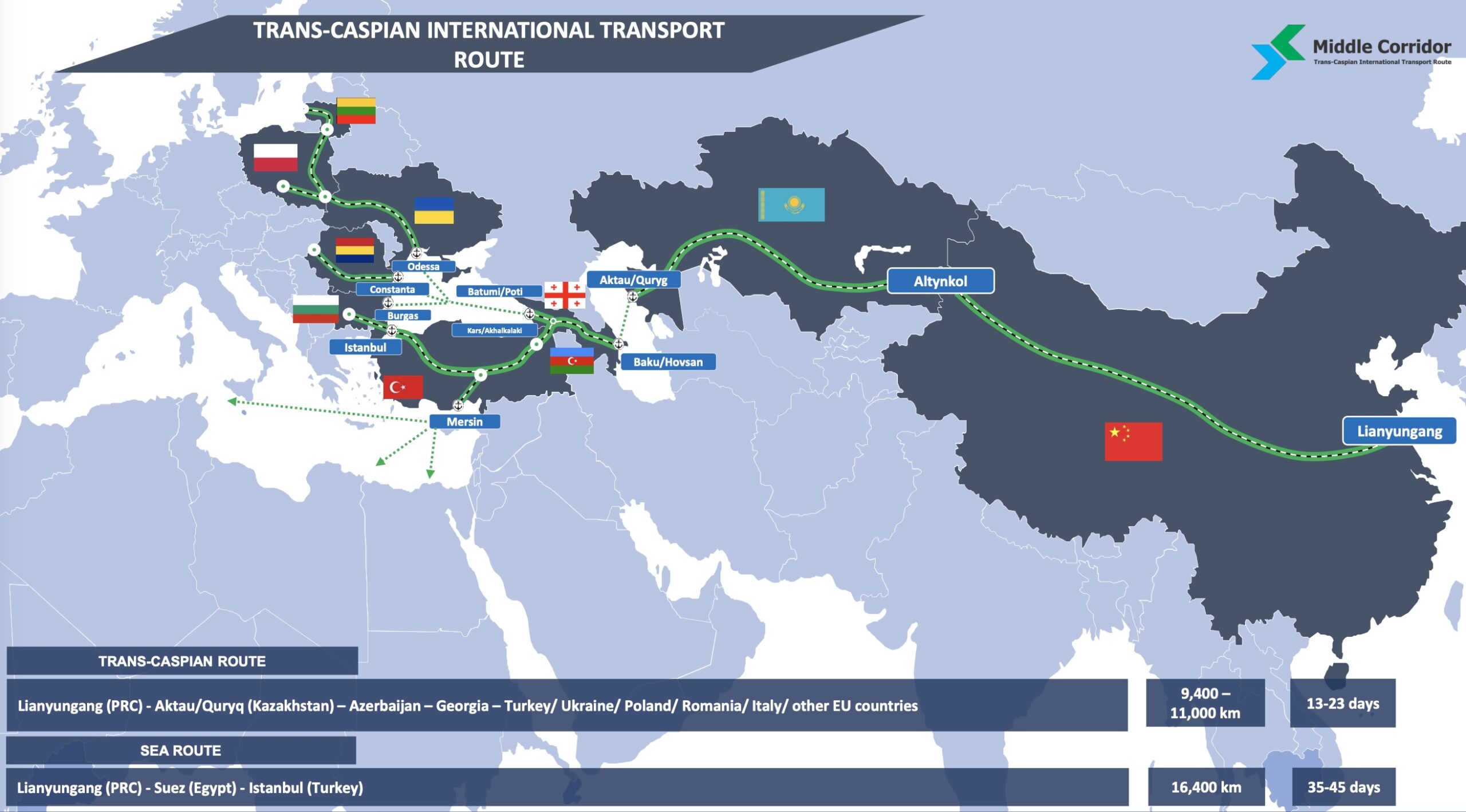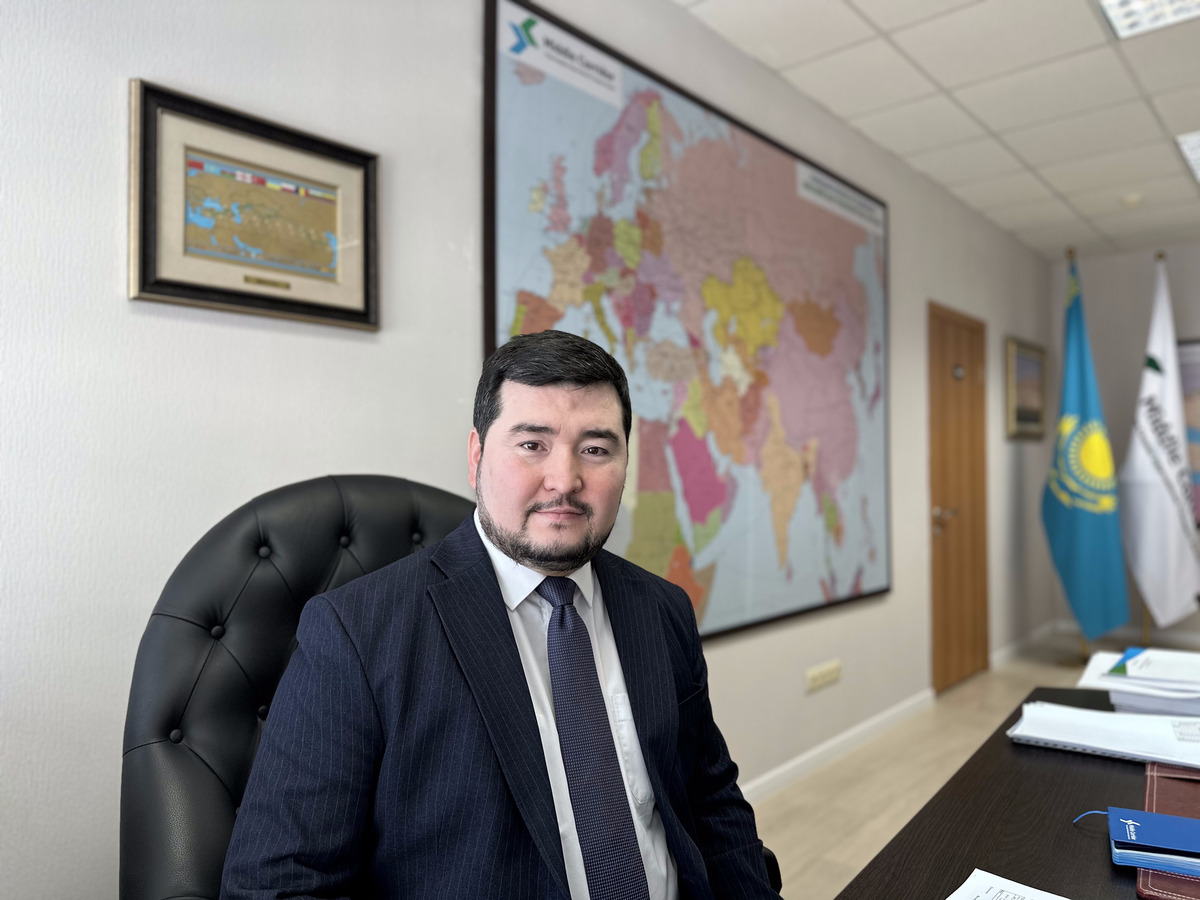ASTANA—Developing the Middle Corridor is a key factor in expanding Kazakhstan’s economy and that of Central Asia, said Gaidar Abdikerimov, the Secretary General of the Trans-Caspian International Transport Route (TITR) International Association. In an interview with the Astana Times, he spoke about the association’s role and contribution to boosting connectivity along the Middle Corridor.

Middle Corridor. Photo credit: TITR
The international association was established in 2017. “Initially founded by three countries – Kazakhstan, Azerbaijan and Georgia—with seven companies, the association has since expanded to encompass 11 countries with 25 infrastructure and logistics companies,” said Abdikerimov.
TITR continues to explore and implement large infrastructure projects for smooth and efficient transborder connectivity options with key countries along the Middle Corridor, including Azerbaijan.

Gaidar Abdikerimov. Photo credit: astanatimes.com
Today, on March 11, during Kazakh President Kassym-Jomart Tokayev’s state visit to Azerbaijan to meet President of Azerbaijan Ilham Aliyev, discussions will prominently feature the development of TITR and Azerbaijan’s potential role as a transshipment point for Kazakh oil and uranium, as well as a consumer of Kazakh goods, including wheat.
Kazakhstan’s potential along the Middle Corridor
Central Asia and Kazakhstan, in particular, are assuming a progressively pivotal role as a transportation hub.
“Kazakhstan plays an important role. This transport corridor was established to connect the Central Asian countries with Türkiye, Europe and North African countries, as there was always a demand for our manufactured goods and raw materials. But due to the geopolitical situation, our role has changed. It has grown since 2022. Cargo flows originating from East Asia pass through the territory of Kazakhstan non-stop. Covering more than 3,000 kilometers in three days is a great achievement and an indicator of Kazakhstan’s big role,” said Abdikerimov.
“Apart from that, 80% of cargo flow is from Kazakhstan as it is Kazakhstan’s export that includes oil and oil products, non-ferrous metal, grain crops, wheat, sulfur – all these moving through the Middle Corridor. There are a lot of people and companies involved in this work. We have to manage it all. We have to create conditions for all the parties involved,” he added.
Developing logistics stands as a cornerstone in Kazakhstan’s economic growth, according to Abdikerimov.
“If we can get the logistics right, we can have a significant economic advancement. Numerous factors impede economic growth, with energy resources and logistics being biggest among them. As you know, Kazakhstan and the Central Asian states, [being landlocked countries], do not have a direct access to the world market, therefore initiatives such as the transport corridor are important and necessary not only for Kazakhstan, but for all the Central Asian states,” said Abdikerimov.
Activities along the Middle Corridor
“The summer of 2022 served as both a pivotal test and a valuable lesson for us. With the sudden influx of containers from other corridors into ours, we faced significant congestion and traffic bottlenecks. This resulted in cargo being held up at borders and ports,” said Abdikerimov.
TITR had to take active steps to restore cargo flow and benefit from the strong transportation demand.
“First, we dealt with bottlenecks on an operational level to optimize the use of existing resources without investing a lot of money. The second measure was the five-year road map signed in Aktau city in 2022 with the participation of eight ministers. Work is currently undergoing on it,” said Abdikerimov.
The road map builds on the ministerial meeting on Trans-Caspian connectivity that took place in Aktau on Nov. 25, 2022, where the foreign ministers and transport ministers of Kazakhstan, Azerbaijan, Georgia and Türkiye met to discuss steps to accelerate the development of international transport routes through the modernization of their functioning conditions.
Abdikerimov also mapped out the nearest plans for the development of the railways and ports.
“Infrastructure projects totaling over six billion euros (US$6.5 billion) are currently in progress, including the construction of the second line of the Dostyk-Aktogai-Moiynty and Shalkar-Beineu-Mangystau railway junctions, as well as the Almaty bypass railway. These projects promise significant enhancements to future traffic corridors, addressing concerns of congestion. Such infrastructural projects are crucial for mitigating and preempting traffic bottlenecks,” said Abdikerimov.
Plans are underway to construct a large container hub at Aktau port, alongside efforts to deepen the water harbor there and in Kuryk port. Additionally, wheat terminals are being constructed.
“These are all the current steps that will increase our logistics potential in the future. We will start to see its results in three to four years,” said Abdikerimov.
The Middle Corridor is also witnessing rapid digital transformation to accelerate the pace of operations along the whole corridor.
“A large digital platform is being developed along our transport corridor by PSA International company from Singapore. Its subsidiary company, Global DTC [Digital Transport Corridor], is creating a platform for us. Nurlan Sauranbayev, the chairman of Kazakhstan Temir Zholy (KTZ) national railway company, told the President about it at the opening ceremony of the Innovation Center. It will be launched by the end of this year or early next year. Then all the states will integrate and commence their operations,” said Abdikerimov.
The pilot version of the project called Tez Customs (Quick Customs) was launched at the China-Kazakhstan border in December 2023. Tez Customs platform provides automation of paperless customs transit clearance process, including preparation of preliminary information, automatic registration and release of transit declarations.
“Certainly, digitization represents our future and an unavoidable reality. We are collectively moving towards it, recognizing the demands of the times. Hence, our efforts in this area are significant,” added Abdikerimov.
According to him, addressing the logistics issues requires collective efforts from all involved governments and international organizations, and Kazakhstan’s multi-vector approach is essential in this regard.
“Kazakhstan’s multi-vector policy is yielding positive results. We engage freely with various countries, transportation and logistics companies, as well as international organizations and development institutions, such as the European Bank for Reconstruction and Development and the World Bank,” said Abdikerimov.
